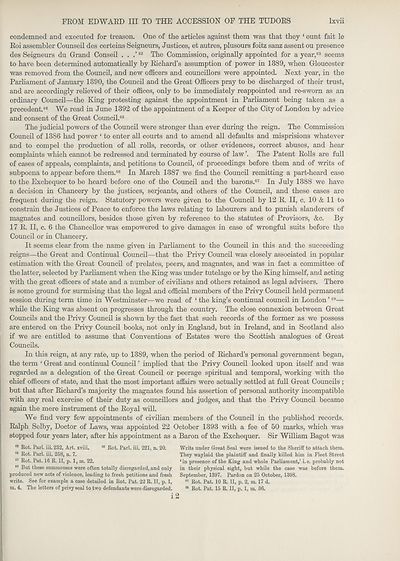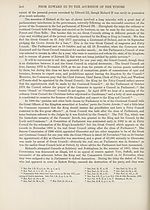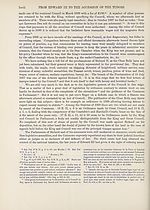Bibliography of royal proclamations of the Tudor and Stuart sovereigns and of others published under authority, 1485-1714 > England and Wales
(79) Page lxvii
Download files
Complete book:
Individual page:
Thumbnail gallery: Grid view | List view

FROM EDWARD III TO THE ACCESSION OF THE TUDORS
Ixvii
condemned and executed for treason. One of the articles against them was that they ‘ ount fait le
Roi assembler Counseil des certeins Seigneurs, Justices, et autres, plusours foitz sanz assent ou presence
des Seigneurs du Grand Conseil . . e2 The Commission, originally appointed for a year,03 seems
to have been determined automatically by Richard’s assumption of power in 1389, when Gloucester
was removed from the Council, and new officers and councillors were appointed. Next year, in the
Parliament of January 1390, the Council and the Great Officers pray to be discharged of their trust,
and are accordingly relieved of their offices, only to be immediately reappointed and re-sworn as an
ordinary Council—the King protesting against the appointment in Parliament being taken as a
precedent.64 We read in June 1392 of the appointment of a Keeper of the City of London by advice
and consent of the Great Council.65
The judicial powers of the Council were stronger than ever during the reign. The Commission
Council of 1386 had power ‘ to enter all courts and to amend all defaults and misprisions whatever
and to compel the production of all rolls, records, or other evidences, correct abuses, and hear
complaints which cannot be redressed and terminated by course of law ’. The Patent Rolls are full
of cases of appeals, complaints, and petitions to Council, of proceedings before them and of writs of
subpoena to appear before them.66 In March 1387 we find the Council remitting a part-heard case
to the Exchequer to be heard before one of the Council and the barons.67 In July 1388 we have
a decision in Chancery by the justices, serjeants, and others of the Council, and these cases are
frequent during the reign. Statutory powers were given to the Council by 12 R. II, c. 10 & 11 to
constrain the Justices of Peace to enforce the laws relating to labourers and to punish slanderers of
magnates and councillors, besides those given by reference to the statutes of Provisors, &c. By
17 R. II, c. 6 the Chancellor was empowered to give damages in case of wrongful suits before the
Council or in Chancery.
It seems clear from the name given in Parliament to the Council in this and the succeeding
reigns—the Great and Continual Council—that the Privy Council was closely associated in popular
estimation with the Great Council of prelates, peers, and magnates, and was in fact a committee of
the latter, selected by Parliament when the King was under tutelage or by the King himself, and acting
with the great officers of state and a number of civilians and others retained as legal advisers. There
is some ground for surmising that the legal and official members of the Privy Council held permanent
session during term time in Westminster—we read of ‘ the king’s continual council in London ’68—
while the King was absent on progresses through the country. The close connexion between Great
Councils and the Privy Council is shown by the fact that such records of the former as we possess
are entered on the Privy Council books, not only in England, but in Ireland, and in Scotland also
if we are entitled to assume that Conventions of Estates were the Scottish analogues of Great
Councils.
In this reign, at any rate, up to 1389, when the period of Richard’s personal government began,
the term ‘ Great and continual Council ’ implied that the Privy Council looked upon itself and was
regarded as a delegation of the Great Council or peerage spiritual and temporal, working with the
chief officers of state, and that the most important affairs were actually settled at full Great Councils ;
but that after Richard’s majority the magnates found his assertion of personal authority incompatible
with any real exercise of their duty as councillors and judges, and that the Privy Council became
again the mere instrument of the Royal will.
We find very few appointments of civilian members of the Council in the published records.
Ralph Selby, Doctor of Laws, was appointed 22 October 1393 with a fee of 50 marks, which was
stopped four years later, after his appointment as a Baron of the Exchequer. Sir William Bagot was
62 Rot. Pari. ill. 232, Art. xviii. 63 Rot. Pari. iii. 221, n. 20. Writs under Great Seal were issued to the Sheriff to attach them.
64 Rot. Pari. iii. 258, n. 7. They waylaid the plaintiff and finally killed him in Fleet Street
65 Rot. Pat. 16 R. II, p. 1 m. 22. ‘ in presence of the King and whole Parliament,’ i. e. probably not
68 But these summonses were often totally disregarded, and only in their physical sight, but while the case was before them.
produced new acts of violence, leading to fresh petitions and fresh September, 1397. Pardon on 25 October, 1398.
writs. See for example a case detailed in Rot. Pat. 22 R. II, p. 1, 67 Rot. Pat. 10 R. II, p. 2, m. 17 d.
m. 4. The letters of privy seal to two defendants were disregarded. 68 Rot. Pat. 15 R. II, p. 1, m. 36.
i 2
Ixvii
condemned and executed for treason. One of the articles against them was that they ‘ ount fait le
Roi assembler Counseil des certeins Seigneurs, Justices, et autres, plusours foitz sanz assent ou presence
des Seigneurs du Grand Conseil . . e2 The Commission, originally appointed for a year,03 seems
to have been determined automatically by Richard’s assumption of power in 1389, when Gloucester
was removed from the Council, and new officers and councillors were appointed. Next year, in the
Parliament of January 1390, the Council and the Great Officers pray to be discharged of their trust,
and are accordingly relieved of their offices, only to be immediately reappointed and re-sworn as an
ordinary Council—the King protesting against the appointment in Parliament being taken as a
precedent.64 We read in June 1392 of the appointment of a Keeper of the City of London by advice
and consent of the Great Council.65
The judicial powers of the Council were stronger than ever during the reign. The Commission
Council of 1386 had power ‘ to enter all courts and to amend all defaults and misprisions whatever
and to compel the production of all rolls, records, or other evidences, correct abuses, and hear
complaints which cannot be redressed and terminated by course of law ’. The Patent Rolls are full
of cases of appeals, complaints, and petitions to Council, of proceedings before them and of writs of
subpoena to appear before them.66 In March 1387 we find the Council remitting a part-heard case
to the Exchequer to be heard before one of the Council and the barons.67 In July 1388 we have
a decision in Chancery by the justices, serjeants, and others of the Council, and these cases are
frequent during the reign. Statutory powers were given to the Council by 12 R. II, c. 10 & 11 to
constrain the Justices of Peace to enforce the laws relating to labourers and to punish slanderers of
magnates and councillors, besides those given by reference to the statutes of Provisors, &c. By
17 R. II, c. 6 the Chancellor was empowered to give damages in case of wrongful suits before the
Council or in Chancery.
It seems clear from the name given in Parliament to the Council in this and the succeeding
reigns—the Great and Continual Council—that the Privy Council was closely associated in popular
estimation with the Great Council of prelates, peers, and magnates, and was in fact a committee of
the latter, selected by Parliament when the King was under tutelage or by the King himself, and acting
with the great officers of state and a number of civilians and others retained as legal advisers. There
is some ground for surmising that the legal and official members of the Privy Council held permanent
session during term time in Westminster—we read of ‘ the king’s continual council in London ’68—
while the King was absent on progresses through the country. The close connexion between Great
Councils and the Privy Council is shown by the fact that such records of the former as we possess
are entered on the Privy Council books, not only in England, but in Ireland, and in Scotland also
if we are entitled to assume that Conventions of Estates were the Scottish analogues of Great
Councils.
In this reign, at any rate, up to 1389, when the period of Richard’s personal government began,
the term ‘ Great and continual Council ’ implied that the Privy Council looked upon itself and was
regarded as a delegation of the Great Council or peerage spiritual and temporal, working with the
chief officers of state, and that the most important affairs were actually settled at full Great Councils ;
but that after Richard’s majority the magnates found his assertion of personal authority incompatible
with any real exercise of their duty as councillors and judges, and that the Privy Council became
again the mere instrument of the Royal will.
We find very few appointments of civilian members of the Council in the published records.
Ralph Selby, Doctor of Laws, was appointed 22 October 1393 with a fee of 50 marks, which was
stopped four years later, after his appointment as a Baron of the Exchequer. Sir William Bagot was
62 Rot. Pari. ill. 232, Art. xviii. 63 Rot. Pari. iii. 221, n. 20. Writs under Great Seal were issued to the Sheriff to attach them.
64 Rot. Pari. iii. 258, n. 7. They waylaid the plaintiff and finally killed him in Fleet Street
65 Rot. Pat. 16 R. II, p. 1 m. 22. ‘ in presence of the King and whole Parliament,’ i. e. probably not
68 But these summonses were often totally disregarded, and only in their physical sight, but while the case was before them.
produced new acts of violence, leading to fresh petitions and fresh September, 1397. Pardon on 25 October, 1398.
writs. See for example a case detailed in Rot. Pat. 22 R. II, p. 1, 67 Rot. Pat. 10 R. II, p. 2, m. 17 d.
m. 4. The letters of privy seal to two defendants were disregarded. 68 Rot. Pat. 15 R. II, p. 1, m. 36.
i 2
Set display mode to: Large image | Transcription
Images and transcriptions on this page, including medium image downloads, may be used under the Creative Commons Attribution 4.0 International Licence unless otherwise stated. ![]()
| Permanent URL | https://digital.nls.uk/106224886 |
|---|
| Attribution and copyright: |
|
|---|
| Description | Privately printed catalogues of the special collections of the Bibliotheca Lindesiana, the family library of the Earls of Crawford and Balcarres. Reformation Tracts, English Newspapers and De Bry Collection catalogues provide the only record of the contents of these collections. Also include catalogues of Bibliotheca Lindesiana collections now held elsewhere. |
|---|

